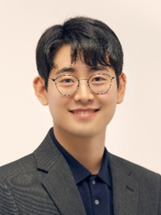 The 2022 Franzosini Award was given to Yongheum Jo, in recognition of his contribution to the IUPAC Solubility Data Project, at the 22nd Annual Meeting of the IUPAC Subcommittee on Solubility and Equilibrium Data, held in Bragança, Portugal, on 4 September 2022, during the 20th International Symposium on Solubility Phenomena and Related Equilibrium Processes.
The 2022 Franzosini Award was given to Yongheum Jo, in recognition of his contribution to the IUPAC Solubility Data Project, at the 22nd Annual Meeting of the IUPAC Subcommittee on Solubility and Equilibrium Data, held in Bragança, Portugal, on 4 September 2022, during the 20th International Symposium on Solubility Phenomena and Related Equilibrium Processes.
Dr. Yongheum Jo completed his bachelor’s degree in 2014 and master’s degree in 2016, both from the Korea Advanced Institute of Science and Technology (KAIST) in South Korea. He then received a PhD in radiochemistry in the Department of Nuclear Engineering under the academic supervision of Prof. Jong-Il Yun (KAIST). The title of his PhD dissertation was “Study on complexation of ternary M-AnO2-CO3 species at elevated temperatures (M = Mg, Ca; An = U, Pu)”. During his PhD at KAIST, Yongheum Jo specialized in aquatic radiochemistry and laser spectroscopy to explore the chemical behavior of nuclides closely associated with nuclear energy. His studies aimed to experimentally generate fundamental chemical thermodynamic data for radionuclides of main interest as well as investigating radionuclide retention processes. A main topic in this PhD was the ternary complexation of uranium(VI) and plutonium(VI) with calcium and magnesium ions in carbonate-containing aqueous solution. Here he gained new insight into ternary M-AnO2-CO3 species, which can influence the behavior of these elements in the hexavalent oxidation state. He also studied temperature effects on these important species and gained first ever experimental evidence on the ternary Ca-complexation of Pu(VI) carbonate species. The related publications were placed at important scientific journals and were very well received.
As a second topic in his PhD, new studies on U(VI) retention processes on silica and alumina were performed using spectroscopic laser-based techniques. The work contributed to the detailed elucidation of surface retention processes by providing new evidence on the chemical characteristics of U(VI) surface species interacting at the mineral-water interface.
Following his PhD studies at KAIST, Dr. Jo did a PostDoc at the Institute for Nuclear Waste Disposal (Institut für Nukleare Entsorgung, INE) of the Karlsruhe Institute of Technology (KIT), Germany, from 2020 to 2022. Research at KIT-INE was mainly focusing on a better description of Nb(V) aquatic chemistry in cementitious environments. Niobium-94 is an activation product potentially present as part of nuclear waste, and a better understanding of Nb aqueous speciation and retention processes in cementitious environments are needed to provide a significantly improved description of Nb(V) mobility in an applied repository context. Yongheum Jo was able to significantly improve the understanding of Nb(V) solids solubility in alkaline solutions characteristic for cement-based systems. He established that a Calcium-Niobate (Ca2Nb2O7(s)) solid phase is limiting Nb(V) behavior in the investigated cases, with the respective solid phase being characterized in detail by using various spectroscopic tools available at KIT-INE.
A second topic within the PostDoc studies of Dr. Jo centered on the further investigation of Pu(VI) speciation in the Ca containing carbonate system by EXAFS technique. Results provide structural information of ternary Pu(VI) species, CaPuO2(CO3)32-. This is the first ever spectroscopic evidence of such ternary Ca-Pu(VI)-CO3 complexes obtained using advanced synchrotron techniques.
After his PostDoc at KIT-INE, Dr. Jo worked as a senior researcher at Korea Atomic Energy Research Institute (KAERI) from 2022 to 2023. Starting in 2023, Dr. Jo assumed the role of an assistant professor in the Department of Nuclear Engineering at Hanyang University in Korea. His current work focuses on Nb solids solubility in alkaline aqueous solution in the presence of organic materials. The objective of this topic is to establish a comprehensive chemical thermodynamic description of Nb solids solubility in the presence of organic compounds and Nb-organic complexation. In addition, he is developing a chemical model that depict the chemical interaction between organics and cementitious materials, covering dissolution and precipitation phenomena. Building on his previous work, he is expanding his investigation to explore the ternary M-AnO2-CO3 system in the context of neptunium(VI) to derive chemical equilibrium data. His research group will continue to explore the chemical thermodynamics to unravel the chemical processes of radionuclides in various environments.
Yongheum Jo has an impressive set of excellent scientific knowledge and expertise. This is covering a broad field in the context of actinide and radionuclide chemistry relevant in fundamental research and to assess scenarios in nuclear waste disposal and the back-end of nuclear fuel cycle. Studies on solubility phenomena and the related chemical speciation play a key role in his research profile. (ORCID 0000-0003-2425-389X)
Yongheum Jo’s sponsor for this award was Marcus Altmaier, Deputy Director, Head of Radiochemistry Division, Karlsruhe Institute of Technology (KIT), Institute for Nuclear Waste Disposal (INE), Karlsruhe, Germany.
About the Franzosini Award
The Franzosini Award was established by the former Solubility Data Commission (old IUPAC Commission V.8), in 1988. The main goal has been to assist promising young contributors to the Solubility Data Project. The Subcommittee on Solubility and Equilibrium Data (SSED) of the IUPAC Analytical Chemistry Division, established in 2009 that a maximum of two awards could be given, in even years only, to coincide with the International Symposium on Solubility Phenomena and Related Equilibrium Processes (ISSP), to young scientists working in the areas of solubility and homogeneous systems equilibrium data. The awardees must attend the International Symposium on Solubility Phenomena and Related Equilibrium Processes, the biannual conference organized by the SSED. In the last 34 years (to 2022) there have been twenty-six recipients of this award, often leading to new collaborations. The list of the Franzosini Award recipients can be seen @ https://iupac.org/what-we-do/awards/franzosini-award/.
The Call for the 2022 was released in October 2021 and provided the details and requirements – see https://iupac.org/2022-franzosini-award-call-for-nominations/
